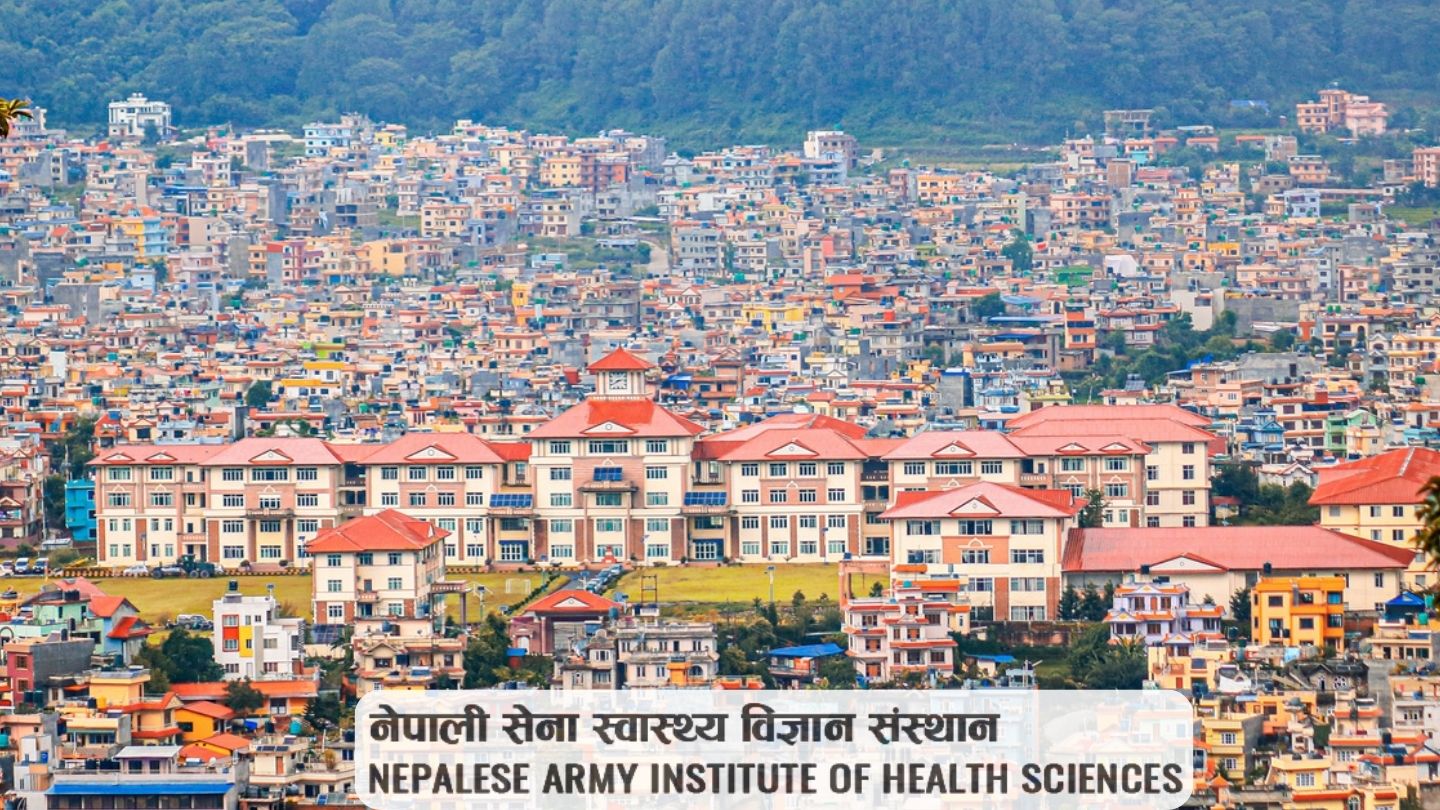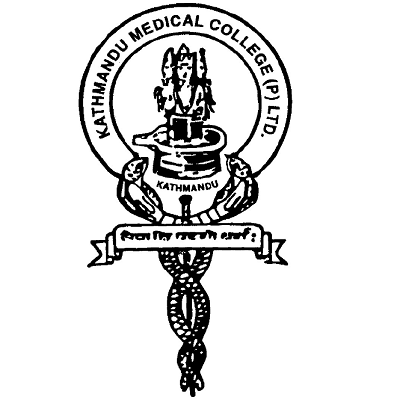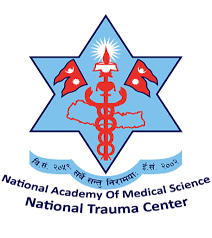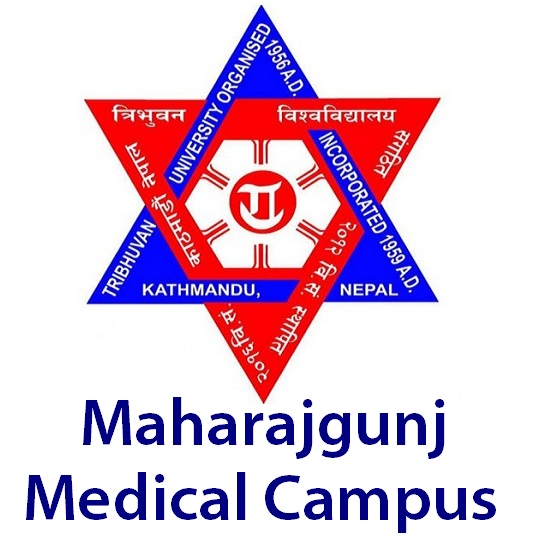Overview
MD in Psychiatry at Nepalese Army Institute of Health Sciences (NAIHS) College of Medicine
MD in Psychiatry at Nepalese Army Institute of Health Sciences (NAIHS) College of Medicine is a three-year postgraduate medical program under Tribhuvan University, Institute of Medicine (TU-IOM).
NAIHS-College of Medicine, located in Sanobharyang, Bhandarkhal, Kathmandu, functions as a medical institution of the Nepali Army and runs undergraduate, postgraduate and DM/MCh programs. It operates under TU affiliation and is recognised by the Medical Education Commission (MEC), Nepal Medical Council (NMC) and Nepal Health Professional Council.
MD in Psychiatry at NAIHS aims to prepare you to diagnose, manage and follow up mental health conditions in hospital and community settings, while also building skills in teaching and research. The program brings together structured clinical postings, academic seminars and supervised responsibility in psychiatry services at the institute’s teaching hospital.
For many students, this course becomes a pathway to work as a consultant psychiatrist, educator and mental health advocate in Nepal and beyond.

Highlights
-
Course: MD in Psychiatry
-
Institution: NAIHS College of Medicine, Kathmandu
-
Affiliation: Tribhuvan University, Institute of Medicine (TU-IOM)
-
Regulatory bodies: Medical Education Commission (MEC), Nepal Medical Council (NMC)
-
Duration: 3 years (residency format)
-
Intake at NAIHS: 2 seats in MD in Psychiatry
-
Approximate tuition fee: NPR 2,381,760 for the full three-year course for clinical MD/MS programs, as per MEC-approved fee levels used across universities in Nepal.
Curriculum Details
The MD in Psychiatry curriculum at NAIHS follows the TU-IOM postgraduate framework. The structure combines core psychiatric theory, supervised clinical practice and mandatory research work.
Key academic areas generally covered include:
-
General adult psychiatry
-
Consultation–liaison psychiatry
-
Child and adolescent psychiatry
-
Geriatric psychiatry
-
Substance use disorders
-
Emergency and crisis psychiatry
-
Community psychiatry and rehabilitation
-
Psychotherapy principles and methods
-
Psychiatric aspects of medical and neurological illnesses
-
Mental health legislation, ethics and human rights
Alongside clinical content, the syllabus addresses:
-
Psychopharmacology and rational use of psychotropic medicines
-
Psychological assessment and psychometrics
-
Research methods, biostatistics and critical appraisal
-
Teaching and presentation skills for academic practice
Residents are expected to maintain logbooks, participate in journal clubs, present cases in departmental meetings and complete a thesis as per TU and NMC regulations for MD/MS programs.
Objectives
The MD in Psychiatry program at NAIHS aims to:
-
Prepare clinicians who can independently assess, diagnose and manage common and severe mental health conditions.
-
Build skills for working with individuals, families and groups across different stages of life.
-
Develop psychiatrists who understand the social, cultural and biological aspects of mental health in the Nepali context.
-
Train future faculty members capable of teaching psychiatry and mental health to undergraduate and postgraduate learners.
-
Encourage participation in mental health research, service evaluation and policy dialogue.
Scope
Mental health services in Nepal are gradually expanding in tertiary hospitals, zonal hospitals and private centres, but specialist numbers remain limited compared to community needs. MD Psychiatry appears as one of the core clinical specialties within TU-IOM and national postgraduate offerings.
Graduates from NAIHS can contribute in:
-
Teaching hospitals and medical colleges as consultant psychiatrists and faculty
-
General hospitals with psychiatric units or liaison services
-
Community mental health programs run by government, NGOs or INGOs
-
Rehabilitation centres for substance use and other behavioural conditions
-
Policy, training and guideline development related to mental health services
For students with interest in long-term patient relationships, multidisciplinary teamwork and socially relevant work, psychiatry offers a meaningful and growing field.
Learning Outcomes
By the end of MD in Psychiatry at NAIHS, students are expected to:
-
Take detailed psychiatric histories and conduct mental status examinations.
-
Formulate diagnoses using ICD or DSM systems and plan management accordingly.
-
Manage psychiatric emergencies such as suicidal behaviour, severe agitation and delirium.
-
Use psychotropic medicines safely, including monitoring for side effects and interactions.
-
Provide basic forms of psychotherapy suitable for the setting and refer for specialised therapies when needed.
-
Work in multidisciplinary teams with psychologists, social workers, nurses and other professionals.
-
Conduct and present research projects related to psychiatric practice or mental health services.
-
Teach core psychiatry topics to medical students and other health professionals.
Skill Development Modules
Learning in MD Psychiatry at NAIHS develops a range of clinical, communication and academic skills over three years.
Key skill domains include:
-
Clinical interviewing and diagnostic formulation
-
Short-term and long-term management planning
-
Crisis intervention and de-escalation techniques
-
Use of rating scales and structured assessment tools
-
Psychoeducation for patients and families
-
Liaison work with other specialties such as medicine, neurology and obstetrics
-
Group discussions, case presentations and seminar delivery
-
Research planning, data collection and manuscript preparation
These skills help you progress from close supervision in the first year towards more independent responsibility in later years, while still under consultant oversight.
Teaching Methodology
Teaching–learning methods in MD Psychiatry align with general MD/MS regulations in Nepal and standard psychiatric training practices.
Common approaches include:
-
Bedside and outpatient teaching during daily clinical work
-
Structured ward rounds with faculty, including case discussions
-
Departmental seminars, tutorials and topic presentations
-
Journal clubs focused on current evidence and guidelines
-
Case conferences with other departments for complex conditions
-
Participation in community visits and outreach activities where available
-
Regular formative assessments, viva voce and internal examinations
The overall approach supports gradual growth in clinical confidence, ethical judgement and communication skills.
Admission Requirements
Admission to MD in Psychiatry at NAIHS follows the national framework set by the Medical Education Commission for postgraduate programs.
In general, applicants must:
-
Hold an MBBS or equivalent degree from an institution recognised by the Government of Nepal.
-
Have valid registration with Nepal Medical Council or the relevant council in the applicant’s country.
-
Have the required internship and experience as per current MEC rules for clinical MD/MS programs.
-
Qualify in the MECEE-PG with at least 50% marks to be included in the merit list.
Seat allocation for NAIHS is completed through MEC’s online matching process, where candidates list preferences and are matched according to rank, category and available capacity.
Because rules and seat distribution can change, applicants should always refer to the latest notices on the MEC and NAIHS official platforms during their admission year.
Career Opportunities
After MD in Psychiatry from NAIHS, you can consider multiple roles:
-
Consultant psychiatrist in teaching or non-teaching hospitals
-
Faculty member in psychiatry departments of medical and nursing colleges
-
Specialist in community-based mental health projects
-
Psychiatrist in rehabilitation and de-addiction centres
-
Researcher or collaborator in mental health and neuroscience projects
-
Technical expert for mental health policy, training modules and guidelines
Many graduates also contribute to advocacy and awareness programs, helping communities understand mental health conditions and access care earlier.
Scholarships and Financial Aid
MEC regulates both seats and fee ceilings for postgraduate medical programs in Nepal, including MD in Psychiatry.
Key points for you as an applicant:
-
A portion of MD/MS seats nationwide are reserved as scholarship seats under MEC rules.
-
Scholarship categories can include open, government service and other specified groups.
-
Institutional (paying) seats are also allocated through the same matching process, but with fee obligations as per MEC-approved structure.
NAIHS, as an army-run institution, may also have internal provisions for army service candidates according to its welfare and service rules. Candidates should always consult the most recent MEC notices and NAIHS prospectus for category-wise details in each academic cycle.
Why Choose This Course (MD in Psychiatry at NAIHS College of Medicine)?
From the institution’s perspective, MD in Psychiatry at NAIHS offers:
-
Clear affiliation with TU-IOM and recognition by MEC and NMC, supporting academic and professional credibility.
-
A teaching hospital environment where psychiatry interacts daily with medicine, surgery, paediatrics and other fields.
-
Small intake (2 seats), which allows closer supervision, regular feedback and space to discuss complex cases.
-
Integration of clinical work, teaching responsibilities and research, preparing you for varied roles after graduation.
If you care about long-term patient relationships, social context of illness, and multidisciplinary teamwork, MD Psychiatry at NAIHS gives a structured setting to develop that path.
Conclusion
MD in Psychiatry at NAIHS College of Medicine is a three-year specialist training program under Tribhuvan University that focuses on clinical care, teaching and research in mental health.
For Nepali and international students who wish to work in mental health as clinicians and educators, this course provides a recognised route grounded in national regulations and institutional experience. Careful preparation for MECEE-PG, along with clear motivation for psychiatry, will help you make the most of the training opportunity at NAIHS.
Frequently Asked Questions (FAQ)
1. How long is the MD in Psychiatry program at NAIHS?
The duration is three years in a residency format under Tribhuvan University, Institute of Medicine.
2. How many seats are there for MD in Psychiatry at NAIHS?
The NAIHS prospectus lists 2 seats for MD in Psychiatry under its TU-affiliated MD/MS programs.
3. What entrance exam do I need to take?
You must appear in the MECEE-PG examination conducted by the Medical Education Commission and achieve at least 50% to be eligible for matching.
4. What is the approximate tuition fee?
Current MEC-approved tuition for clinical MD/MS programs is around NPR 2,381,760 for the full course. NAIHS follows this national fee framework, though you should confirm the exact figure in the latest official notice for your intake year.
5. What kind of work can I do after MD in Psychiatry?
Graduates can work as consultant psychiatrists, faculty in medical and nursing colleges, specialists in community mental health or rehabilitation programs, or researchers in mental health projects, depending on available posts and individual interests.





















